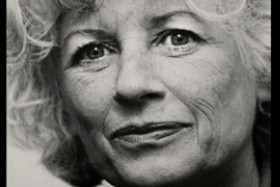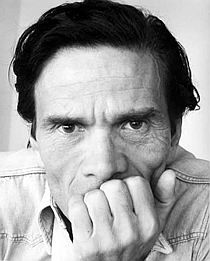Grand old man and enfant terrible of French militant cinema René Vautier died Sunday January 4th in his home in Cancale, Brittany, at the age of 86. Originally from Brittany, René Vautier fought the Germans as a very young member of the French Resistance during the Second World War, at 16 he was decorated with the Croix de Guerre and honoured by de Gaulle. After the war he wanted to pursue the combat but not with arms and his friends then encourage him to take up a new weapon: the camera. His battle was to last a life long.
Vautier graduated in 1948 from the film school IDHEC in Paris. In 1949 he gets a command to make a film for the Ligue de l’enseignement about the benefits of the French educational mission in the West African colonies. The result, Afrique 50, became, on the contrary, a violent critique of the French colonial system. Vautier’s first film was also the first anticolonial film ever to be made in France and the reaction was violent in return: Vautier was faced with 13 charges and sentenced to one year of prison!
The film has an incredible story. To escape the limitations of the 1934 decree of the Minister of the Colonies Pierre Laval (forbidding any filming in the colonies without the presence of a an administration official) Vautier went on to film in secret. He almost got his film rolls confiscated for destruction in Africa but managed to get his work back to France where he finally had to illegally retrieve the reels kept under seizure by the board of censors (he got 17 of 50 reels). The film was finished in secret and stayed censured in France for over 40 years though it was awarded as one of the best documentaries of the year at the World Festival of Youth and Students in Warsaw in 1955 (with Joris Ivens as president of the jury). In 1996, a copy of the film was finally handed over to Vautier by the Foreign Ministry during the first official screening in France and only in 2003 the film was broadcasted on French television. The Cinémathèque française has recently made new copies of the film as part of their effort to safeguard the entire oeuvre of René Vautier initiated in 2007.
Afrique 50 is a short powerful outburst, a rhythmic pamphlet, swiftly edited with an attacking voice-over. Playing with the genre of educational state propaganda documentary but turning it against the government, the film pinpoints, with humour and great seriousness, the link between capitalism and racism. Film historian Nicole Brenez, specialist of avant-garde cinema at la Cinémathèque française, has called it the greatest film in the history of cinema. Go see it, it’s on YouTube!
Vautier got out of prison in 1952 and moved on to make films about Algeria. The first one Une nation, l’Algerie (1956) about the French invasion in 1830 doesn’t exist anymore, of the two copies, one was lost, the other destroyed. In 1956 he joined the Algerian maquis and filmed the National Liberation Front, the Algerian freedom fighters fighting for independence in the Algerian War 1954-62. He was wounded and spent the rest of his life with a piece of camera stuck in his skull and did a total of 25 months in prison. Amongst his films are Algérie en flammes (Algeria in flames, 1958, 20 min.) and Peuple en marche (People marching, 1963, 50 min.) and later the feature film Avoir vingt ans dans les Aurès (To be Twenty in the Aures, 1972, 100 min.) that won the Prix international de la critique in Cannes in 1972. After the independence of Algeria, he initiated the creation of the Centre Audiovisuel d’Alger where he was the director 1962-65 and he is considered as one of the fathers of Algerian cinema.
After having been living in exile for years, partly in Tunisia, due the fact that he was considered a danger to the national security, Vautier, granted amnesty, returns to France in 1967. He was a member of the militant cinema group Medvedkine from the beginning along with Chris Marker, engaged in making cinema a tool for the workers struggle. Settling down in Brittany, he founded the production and distribution company UPCB (Unité de Production Cinématographique de Bretagne) in 1970, in an effort to create a vital forum for cinema outside of Paris.
In 1973 Vautier did a 31 days hunger strike and ended up in hospital in order to obtain authorisation from the Ministry of Culture to distribute the film Octobre à Paris made by Jacques Panijel about the 1961 massacre of Algerian demonstrators by the police forces in Paris (probably more that 200 killed though the official number is still much lower, it took 40 years for the French state to even begin to admit the crime), a documentary banned since 1962. Supported by a great number of film makers (Agnès Varda, Jacques Rivette, Godard, Resnais, Claude Sautet) Vautier finally achieved nothing less than the end of film censorship for political reasons in France (interview in le Monde 14.10.2011).
Thus the story of René Vautier is also the less glorious story of the history of French film censorship and of the amount of control exercised by the authorities under the Fourth and Fifth Republic.
Trouble was not over though. In 1985 Vautier made the documentary À propos de l’autre detail (1985, 40 min.), testimonies of the use of torture during the Algerian War and in particular of an Algerian tortured under the orders of a certain lieutenant Jean Marie Le Pen. The film was a reaction to the fact that Le Pen, the leader of the extreme right party Front National, sued the satiric newspaper Le Canard enchainé for defamation after they had accused him of having used torture while serving the French army. In spite of a 1963 amnesty law forbidding the use of images that could be harmful to the honor of those who had served under the Algerian War, the film was shown in court. When Vautier returned home to Brittany after the trial, he found his archives vandalized: 60 km of film cut in to pieces and drenched with petroleum, totally destroyed …
Vautier also made films about South Africa, racism in France, women joining the workers struggle, immigration, poetry, oil spill and nuclear tests. He was a radical cinematographer, a very important “maker of historical documents”, and an inspiration in terms of alternative ways of production and distribution. He should be a hero to any young filmmaker with a political conscience.
Vautier sums up his cinematographic imperative transforming a quotation from the poet Paul Éluard: “Je filme ce que je vois, ce que je sais, ce qui est vrai” (“I film what I see, what I know, what is true”). He elaborated his thoughts on militant cinema in his memoirs Caméra Citoyenne from 1998.
A brave and remarkable man, and a very important figure of French cinema, is gone. We are lucky to still have most of his films…
Afrique 50 (1950, 17 min.), with English subtitles:
https://www.youtube.com/watch?v=vb3DkggPtaQ
Just recently Les Mutins de Pangée released a DVD-box with the Algerian films (only with French subtitles) in addition to the nice edition of Afrique 50 that comes with a booklet:
http://www.lesmutins.org/coffret-avoir-20-ans-dans-les
For a more detailed and theoretic introduction read Nicole Brenez and Oriane Brun-Moschetti in La Furia Umana (in French):
http://www.lafuriaumana.it/index.php/archives/41-lfu-14/121-nicole-brenez-rene-vautier-devoirs-droits-et-passion-des-images
http://www.lafuriaumana.it/index.php/archives/41-lfu-14/315-oriane-brun-moschetti-l-oeuvre-filmique-de-rene-vautier-un-corpus-etat-des-lieux




